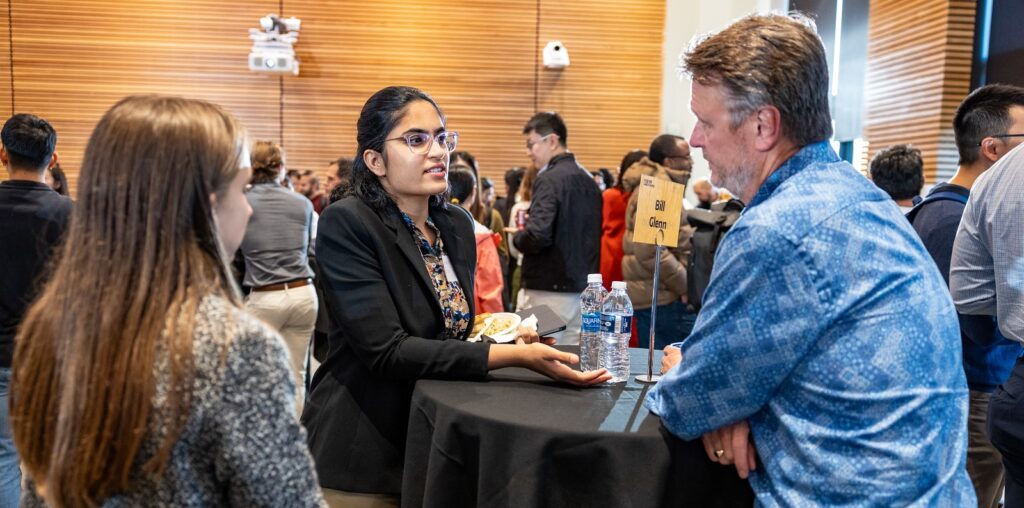
Mentorship matters
Learning from mentors is an integral component of a Foster education — and one that benefits everyone involved
While launching a career is a daunting proposition, one of the surest ways to succeed in the workplace is having an experienced ally in your corner, a mentor. To that end, the UW Foster School of Business has established long-standing yet innovative formal mentorship programs for students at all levels. The school is taking a fresh approach to mentorship, with the express goal of forging relationships between students from a wide variety of backgrounds with top professionals to whom they otherwise would not have had access.
Fostering Mentorship
“It’s hard to ask someone ‘Will you be my mentor?’” says Colette Vogel, director of Foster’s Full-time MBA mentorship program. “Especially without a preexisting relationship in place.” Vogel’s program pairs more than 200 full-time and evening students with over 65 professionals who show them the ropes, make introductions and model how to build relationships. This is the program’s 25th year of creating mentor connections.
Foster mentors have included such well-known figures as Sally Jewell, former Secretary of the Interior and CEO of REI, Joanne Harrell, the First Lady of Seattle, and former Husky Football Coach Chris Petersen. Each says that they have grown from the experience of serving as a mentor.
“This is such an important program,” said Dean Frank Hodge at a recent gathering of mentors and MBA students. “Mentorship is an essential component of the Foster educational journey, and a great opportunity to learn from and be integrated into the business community.”
Foster’s mentorship program provides students with an in-person connection in which MBAs forge relationships that can last well beyond graduation. Foster mentor Rob Grady, General Manager at Amazon, observes that relationship skills are just as crucial to business success as hard skills such as financial modeling and strategic thinking. He encourages students to “think about it as who can be on your personal board of directors.” Diena Mann, Founder and CEO of Spectio, a product enabling AI-powered business-intelligence and named to the Puget Sound Business Journal’s 40 Women Under 40 List, advises students to weave relationship building into their career. “Relationships are everything – not only in your career – but just life in general,” she says.
Mentorship and international students
Mentorship is even more beneficial for international students, who make up an increasing proportion of Foster’s MBA classes, and often don’t have a preexisting network of local contacts. Ashvin Naik, co-founder and CEO of SalesPal, a machine learning and voice technology firm, immigrated from India, received a Foster Executive MBA and established himself in the business world. He understood first-hand an international student’s hesitancy in approaching members of the U.S. business community. As a mentor, he coaches students on ways of asking for guidance, of brainstorming with someone with more experience and the value of a well-placed introduction.
While the Foster program facilities the relationship and sets the format, the material covered is unique based on the student’s interests and needs. Kavya Niranjan (MBA 2023) came to Foster with an undergraduate degree in environmental sciences from UC Berkeley and a career goal of working as a sustainability consultant. The chance to discuss such topics with a sustainability expert of Jewell’s stature presented a remarkable opportunity.
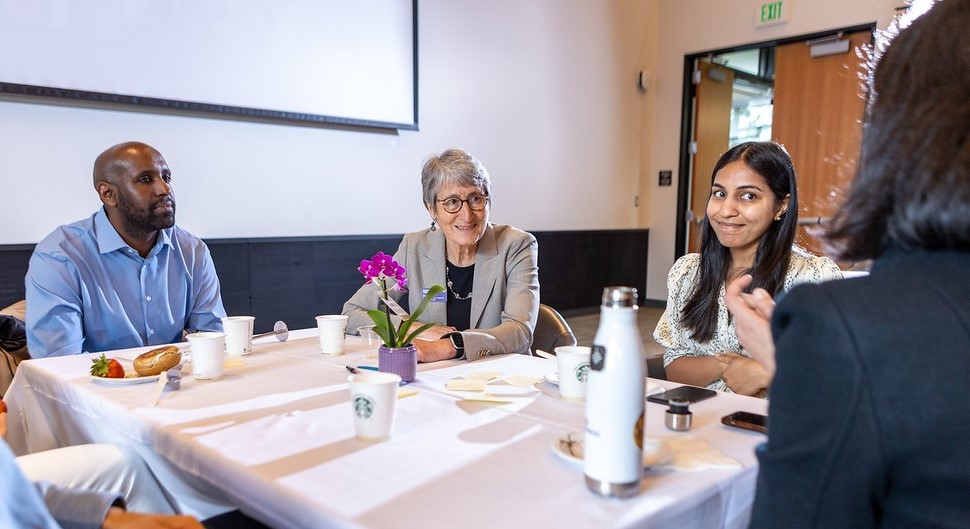
Niranjan and her fellow mentees met with Jewell regularly and discussed a wide range of subjects. Jewell offered some traditional career guidance, but equally as important, engaged in organic discussions about life, sustainability in today’s world, personal satisfaction, and finding one’s purpose.
“I was just being available for students,” Jewell says. “Some were in need of advice on a specific topic, and for others it evolved into a more ongoing relationship around how they can help shape the future.”
Niranjan credits Jewell with making her feel at ease despite the gap in their experience levels. Their group discussions with fellow mentees created bonds among the students, and everyone – including Jewell herself – found the sessions enriching and educational.
“Sally never made me feel like I was speaking with someone who thought they were above me,” Niranjan says. “A lot of our discussions were around our core values. We bounced stories and ideas off of each other, talking about personal passions and ambitions in the corporate world.”
For Jewell, this approach to mentorship is a product of her being a lifelong mentor and mentee. She says she has had many mentors throughout her career, and says these relationships are mutually beneficial. She has provided valuable lessons to her mentors and is continually learning from the students she mentors.
“Mentorship is most effective when there is a mutual respect and appreciation of each other, and an opportunity for two-way communication,” Jewell says. “We all have things to learn from each other. The students that I met with regularly at Foster really helped me understand how challenging it feels for younger people today.”
For Jewell, mentorship provided an opportunity to convey the message that her most notable former boss, President Obama, is best known for. “You have to have hope, especially as a young person,” she says. “If I can share stories that people can relate to with examples from my experience, that can help people see themselves in a picture … with patience and persistence, together we can see a path forward.”
Mentoring moments
Jewell and another one of her mentees, John Sheppard (MBA 2001), appear on the cover of the book “Mentoring Moments,” by Susan Canfield, the founding director of the MBA mentor program at Foster. Canfield launched the program in 1999. In the introduction, Canfield provides a vision for the program that is still in place to this day – to promote mentoring as a highly effective means of advancing the next generation of business leaders. Vogel became Program Director in 2015, continuing the initial mission and adapting it for broader changes in the student population, in our broader culture, and in the workplace.
Today’s students want to have choice and need real-world experience, and the program strives to deliver both. Students meet potential mentors at the beginning of the year at a specifically orchestrated networking session. Through informal conversations they learn mentors’ areas of expertise and approach to mentorship. Students then indicate who they believe would be the best match for them.
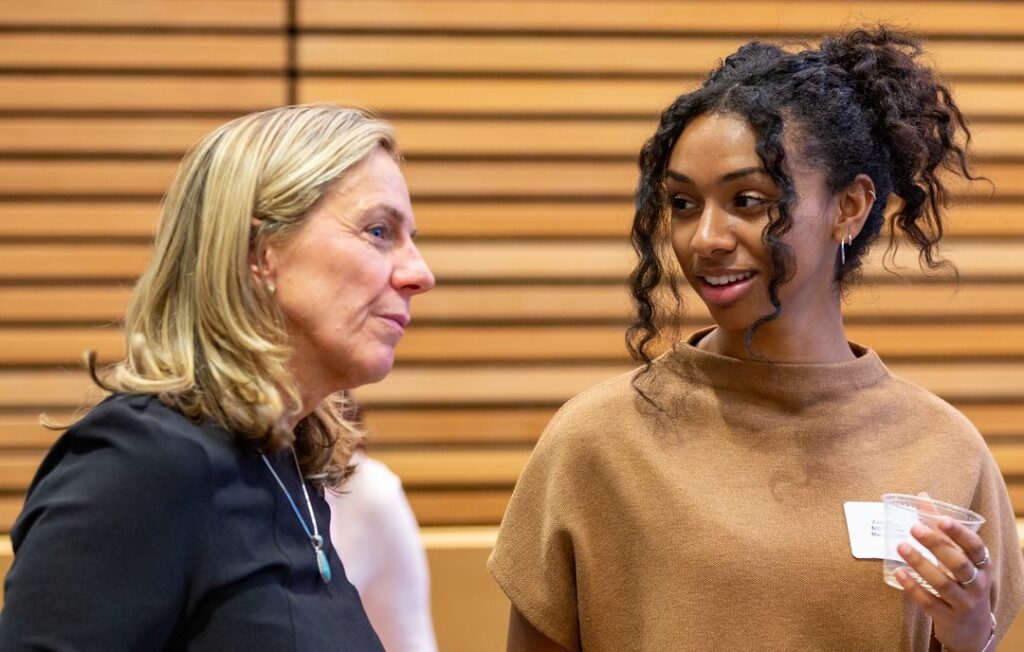
“It’s student driven,” says Vogel. “Research tells us that if the student has agency, and they select their mentor, then they will have a more successful relationship.”
Students also benefit from those experienced mentor voices during the most intense part of the year – the spring job interview season. Vogel worked with key players at Amazon to launch a spring mentor program. Students learn to share and support each other under the guidance of the spring mentor. According to one student who participated, she learned “everyone is anxious interviewing and feels less qualified that they really are…it is not just me.”
Mentorship comes full circle
Vogel and others at Foster are expanding and democratizing mentorship by connecting students to business leaders with whom they wouldn’t otherwise have had the opportunity to learn. Vogel and a group of MBA students co-created a Mentoring Circles for MBAs of Color program. The program, now in its fourth year, allows students of traditionally underrepresented populations to support one another. One Circles mentor, Marcus Dover (MBA 2016), a finance director at Microsoft, draws on his own experience as an MBA student. “I didn’t have a lot of role models for what a career looks like, for how you navigate it. My assumption was you just work hard and you grow,” he says. Now he is providing help that he wishes he had received. “You’re always going to need that person who helps you navigate through a specific problem or helps you accelerate your career.”
Another Circles mentor, Rosalinda Mendoza (MBA 2015), a former tech executive and now Co-Founder and CEO of Mocel Mezcal, a premium artisanal spirit, believes the mentorship she received at Foster was a key experience as she transitioned from non-profit to corporate work. “I was trying to figure out if I could do it,” she recalls. “A UW alum took me under his wing and coached me. It helped me establish myself.” she says.
Now it’s Mendoza who is taking an aspiring student under her wing and sharing connections. It’s this willingness to help graduating students that continually inspires Vogel, who has seen nearly 2,000 students participate in her program. “I’m in awe, given our mentors’ big responsibilities, that they’re willing to give back like this,” she says. “It’s a river of highly skilled, highly motivated professionals who have been valuing relationships, mutual support and learning at Foster for more than two decades. And their care likely will keep that river flowing for at least two decades more.”
“I believe it makes a difference”
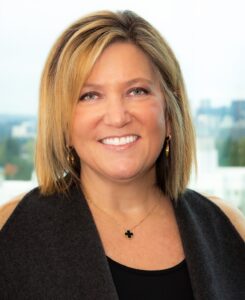 One of the most valuable opportunities available to Foster students participating in the mentorship program is the chance for an onsite visit. Ami Silverman is the Chief Consumer Sales Officer at Microsoft and has been a Foster mentor for 10 years. Not only do her mentees benefit from quality time with her, she also hosts sessions where Foster students can meet and engage with other leaders across Microsoft.
One of the most valuable opportunities available to Foster students participating in the mentorship program is the chance for an onsite visit. Ami Silverman is the Chief Consumer Sales Officer at Microsoft and has been a Foster mentor for 10 years. Not only do her mentees benefit from quality time with her, she also hosts sessions where Foster students can meet and engage with other leaders across Microsoft.
“I bring my mentees in for a full-day visit to Microsoft where they meet with me, but also five or six other leaders,” Silverman says. “I know how important it is to hear different perspectives, so one of my guiding principles in mentorship is to try and give that to each of my mentees by exposing them to multiple leaders.”
Silverman offers some advice to mentees to help them get the most benefit from their time with the mentors. “As a mentee, you will get out if it as much as you put in,” she says. “You want to get the most out of your time together. That means feeling confident to be your true, authentic self and being prepared with questions and topics to discuss that inspire you.”
Mentoring is a passion for Silverman. She’s more than willing to give her time year after year because she sees such value in the program. “I love being able to give back, especially to people who are getting an MBA, which is a pivotal time in their career.”
Mentorship is an integral part of all the MBA programs at Foster. Susie Buysse is the director of career management for multiple Foster MBA programs for experienced professionals. In 2014, the mentoring program was launched for Technology Management MBA students and has since expanded to Hybrid MBA and Global Executive MBA students.
“The program provides one-to-one support, constructive guidance, and candid feedback around career development, and situational advice on tough decisions or challenges,” Buysse says. “We view mentoring as a partnership underpinned by trust, authenticity, and commitment.”
Buysse and her colleagues use a custom software platform to build a mentoring community, support the matching process based on each student’s goals, and measure program effectiveness, such as retaining valued mentors. “Our mentors’ service to Foster is extraordinary,” she says. “Most have mentored for multiple years. All are senior leaders in diverse functions, industries, and companies, including Microsoft, Amazon, Zillow, and Nordstrom.
One of the most effective tactics in increasing the number of students able to participate has been the introduction of learning circles. In these in-person sessions, mentors lead discussions with students about a specific aspect of growing a career, such as increasing your impact at work or navigating office politics.
“We encounter students with diverse and evolving aspirations, from those seeking a career pivot to those managing direct reports or overseeing managers. The mentoring program provides targeted support for these professional transitions or growth trajectories, delivering immediate value for our students.”
Given the high caliber of the professionals who participate in the Foster mentorship program, it is no surprise that the programs incorporate many of the best practices from the business world. All Foster MBA mentor programs apply a data-driven approach, continually measuring outcomes and optimizing based on results.
“We look closely at analytics to grow and strengthen the program. Our team has reviewed MBA programs nationwide,” she says. “And from that analysis, we know our mentoring program is absolutely a competitive advantage. It’s a proven benefit for students to advance their careers.”
Mentorship on a global scale
Mentorship at the Foster School goes far beyond the MBA programs – in fact, it stretches around the globe. The Hovind Global Leaders (HGL) Program selects a group of exceptional undergraduate student leaders with an interest in international business to participate in a formal mentorship program, including a fully-funded trip overseas.
The HGL students participate in weekly global leadership seminar-style courses and discussions, as well as one-on-one meetings with their mentors. Mentors are typically Foster alumni with expertise in global business matters.
The program is highlighted by a one-week immersion in an overseas business environment, recently Rome, including company visits and cultural experiences.
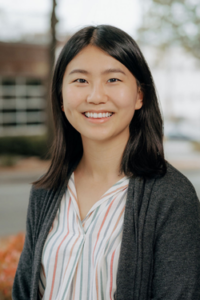
“Getting first-hand experience in navigating other cultures and learning how business is done in other countries is important as students start thinking about their own global career,” says HGL Program Manager Eileen Guo. “When students come back from those trips, they’re so excited, and even more passionate and knowledgeable about traveling and working abroad.”
A key element of the program is providing opportunities to students who otherwise might not have the means to travel abroad. The cohort, usually about 12-14 students per year, is comprised of students passionate about issues around diversity, equity and inclusion, but who have not yet had the chance to travel extensively.
“We are looking for students that are already demonstrating exceptional leadership potential within their communities,” Guo says. “We provide access to opportunities both locally and then abroad that help them develop as inclusive and globally-minded leaders and change-makers.”
Camilo Moreno-Salamanca (BA 2012), an Account Executive at Google, has been a mentor for three years, most recently for Kobey Satoshi Maltos (BA 2025). “I appreciated that our mentorship didn’t focus solely on school or classes,” he says. “We delved into broader topics that interested us both, like working abroad. This allowed us to form a deeper and more meaningful relationship.”
That relationship was pivotal for Maltos, both personally and professionally. “This mentorship has helped me gain clarity about my future aspirations,” he says. “Camilo’s guidance and support have given me the confidence to pursue my unique path instead of following a traditional corporate route. It’s refreshing to have someone who understands and encourages my desire to give back and make an impact.”
As with the MBA programs, the mentors also find the program enriching. Guo recently met with this year’s mentors, who include professionals from Hulu, Microsoft, City of Seattle, and Nike. “We heard from our current mentors their acknowledgement and appreciation of their own mentors. They were fondly remembering Foster faculty or staff, or people in their fields who had mentored them as early career professionals. They returned to the message that mentorship has been such a huge part of their journey, and that it’s very important for them now to be mentors themselves.”
Locally based mentorships for undergraduates are coordinated by the Foster Undergraduate Career Services team. This program, which matches over 50 students a year with local business leaders, is distinguished by a structured approach well-suited for undergraduates who do not yet have extensive expertise in navigating interactions in a business environment.
The Undergraduate mentorship program utilizes several online tools to facilitate a successful mentorship relationship. Students new to the mentorship are encouraged to complete the CliftonStrengths assessment to help identify and classify their strengths and talents and share the results with their mentors. Mentees are presented with a written guide to getting the most of the relationship, including practical advice on best practices, goal setting and potential discussion topics. Additionally, the Husky Landing portal serves to facilitate communication between the mentors and mentees.
“The tools are very helpful,” says Zach Beck, a senior manager of implementation at Amperity, who is serving as an undergraduate mentor for a fifth consecutive year. “This is especially true for first-time mentors or mentees, who out of the gate get structure and suggestions of topics to cover.”
Opening doors for first-generation students
The program also facilitates relationships that otherwise wouldn’t be available to students. This is particularly important for students who come from backgrounds in which they do not have access to the preexisting networks of business professionals and potential employers.
“As a first-generation student, I find that my exposure to professional networks is quite limited. I often encounter uncertainties, particularly when navigating complex aspects of career development, such as negotiating my first salary or grasping the nuanced do’s and don’ts of the corporate world.” says Cam Che (BA 2024).
Che says that being matched with a mentor via the program makes students feel more comfortable asking these types of questions. The mentors join the program with expectations that they will be providing guidance, and that makes reaching out that much easier.
“This program has not only fostered an invaluable lifelong student-mentor relationship for me but has also addressed a crucial need for access to networks and knowledge that are often out of reach for many of us, including myself,” he says. “What makes this program truly exceptional is the quality of mentorship and the supportive environment. My mentor does more than just offer advice; he opens doors to new opportunities, helps me build my confidence, and equips me with the necessary tools to pursue my goals.”
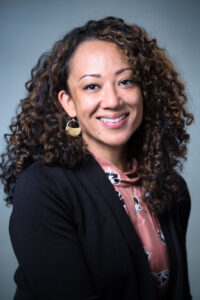
Creating those opportunities for students is one of the most rewarding aspects of the program, according to Tarah Moore, Assistant Director of Undergraduate Career Services.
“The mentorship program serves to connect students with mentors who can make a meaningful difference in their education and in their future,” she says. “We bring together pairings of students and mentors that otherwise wouldn’t happen, and the results are transformative.”
Mentorship at Foster is also a key aspect of several of Foster’s centers, notably the Consulting and Business Development Center (CBDC).
The CBDC coordinates a summer consultancy program consisting of paid internships for Foster undergraduates to work as consultants to small businesses in underserved communities. Each student works with two to three companies gaining experience in areas such as developing marketing plans and financial projections. “The summer consultancy program has professional advisors that serve as mentors to our students and business owners throughout the consulting process, and we encourage continued engagement,” says Kennedy Cockrel, Assistant Director at the CBDC. Over 85% of students participating in CBDC Undergraduate Student Programs report that their experience helped them obtain their first job after graduation.
With the breadth and success of mentorship programs throughout Foster, other institutions are taking notice. “We get other schools calling and asking how this works,” says Vogel. “They’re asking how we match students with mentors, and how we recruit mentors. This is one of the longest running formal mentorship programs and I’m always happy to help. We have great momentum, and it’s thanks to the commitment and generosity of the mentors in the Foster community.”
